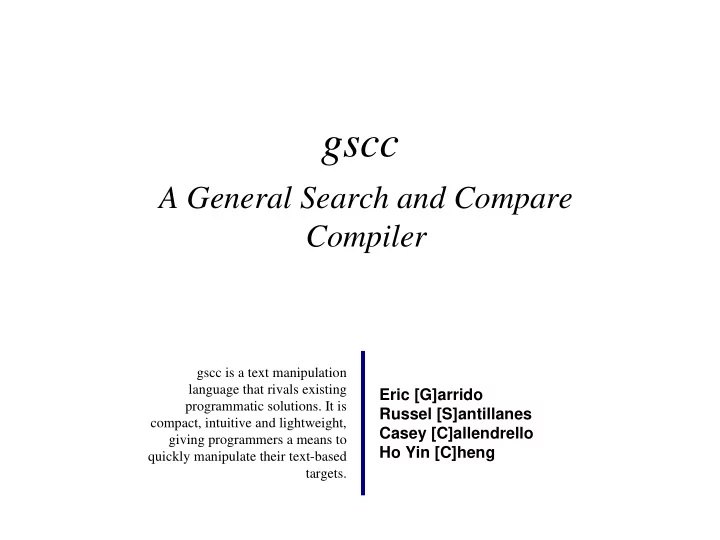

gscc A General Search and Compare Compiler gscc is a text manipulation language that rivals existing Eric [G]arrido programmatic solutions. It is Russel [S]antillanes compact, intuitive and lightweight, Casey [C]allendrello giving programmers a means to Ho Yin [C]heng quickly manipulate their text-based targets.
gscc Language Overview • Text manipulation – Much like AWK – Regular Expressions – Simple commands • set, replace, delete, insert, print/prerr, and more – Feature: Location Variables • @match, @line
High Level Overview text input Mary had a little lamb With fur as white as snow. regex block [wh.*sn..] line { @match = “white as snow” set @match, “blue as water”; } regex block [as] global { set @match, “comme”; print @line; }
High Level Overview text input Mary had a little lamb With fur as white as snow. regex block [wh.*sn..] line { set @match, “blue as water”; } regex block [as] global { @match = “as”; set @match, “comme”; print @line; }
High Level Overview text input Mary had a little lamb With fur as white as snow. regex block [wh.*sn..] line { set @match, “blue as water”; } regex block [as] global { @match = “as”; set @match, “comme”; print @line; }
High Level Overview text input Mary had a little lamb With fur as white as snow. regex block [wh.*sn..] line { @match = “white as snow” set @match, “blue as water”; } regex block [as] global { @match = “as”; set @match, “comme”; print @line; } With fur comme blue as water. With fur comme blue comme water.
Architecture and Implementation
Architecture and Implementation Basics • Front end: Lexer, Parser • Back end: walker, interpreter – Type system – Initial setup: Walker detects program structure, Interpreter remembers AST nodes and walks, later, as needed.
Architecture and Implementation Interface: Interpreter.java • Interacts with walker to execute program public interface Interpreter { public void registerFunction(String name, ParamList paramlist, AST node) public DataType callFunction(String name, ExpressionList explist) public void runCommand(String name, String target, ExpressionList exprlist) public DataType getVariable(String name); public DataType getAttrib(String name, String attrName); public void registerRegexBlock(String regex, String type, AST node); public void runInput(java.io.BufferedReader in, AST program); public void setReturn(DataType value); //plus flow-control }
Architecture gscc ccgsGrammar.g Eric ccgsWalker.g Program File gscc.java AST Walker Lexer Token Stream Parser AST Eric Eric & Casey Stdin/File Interpreter Input Stream Regex Location Backend block Output Stream Data Types Functions Java Regex
Type Hierarchy
Locations @match m a r y h a d a l i t t l e l a m b . \r \n @line • Represented as a linked list internally • changing @match automatically changes @line • changing @line may change @match – the replace @line command may overwrite @match – @match can become undefined
Tutorial
gscc basics • All statements must be within regex blocks and function definitions with the exception of the SET command. • Statement can be a command or a function call.
Your first program return “Hello World”; print $foo() + “\n”; func $foo(){ [H*] line { } }
Making it more useful • Locations give you access to the incoming text – @line, @match are global variables. – @match is the text that matches a regular expression – @line is the whole line being operated on • Modifications to locations affect the next regular expresson block
Finding 404s • Example: Parsing an apache logfile – Say you want to find words that are misspelled resulting in a 404 Apache logfile format: 221.116.200.62 - - [19/Dec/2005:17:08:36 -0500] "POST /xmlsrv/xmlrpc.php HTTP/1.1" 404 278
print $substr(@match, 0, @match.length- A simple example [".*”\s404] line { 4) + “\n”; }
Refining this • Somebody is probing for vulnerabilities. You want to ignore this specific access [xmlrpc\.php] line { set @line, “”;} [".*”\s404] line { print $substr(@match, 0, @match.length-4) + “\n”; }
A More Complete Program • Now say we want to count the number of 404’s as well as print them out. set $count, 0; [xmlrpc\.php] line { set @line, “”;} [".*”\s404] line { set $count, $count+1; print $count + “\t”; print $substr(@match, 0, @match.length-4) + “\n”; }
Other Commands • The previous example used only a small set of the available commands. • Other commands include: replace, delete, insert, prerr • We also have location attributes and the built in function #length for use.
Summary
Project Plan
Lessons Learned • Start early, Start early, Start early. There is no better feeling in the world than finishing your duties or a project ahead of schedule. There is no worse feeling than missing a hard deadline. • Deadlines are an important thing to both know and create. Knowing when what is due keeps people on track and will prevent any unforeseen mishaps. They can also serve as a way to enforce team members to submit work if needed.
More Lessons • Never compromise on your environment. Spending a few hours setting it up in the beginning is easily the best thing you can do with your time. • Constant communication beyond team meetings can help to keep things flowing. If any of the members isn't performing for whatever reason, having people there to remind them serves as a good motivating factor. • If you don't know the answer chances are someone else in your group will or will at the least be able to point you in the right direction. Keep asking until you get the answer you want.
Essentials • http://www.eclipse.org -- Eclipse IDE • http://ANTLReclipse.sourceforge.net/ -- ANTLR plugin for eclipse • http://subversion.tigris.org/ -- Subversion version control system • http://subclipse.tigris.org/ -- Eclipse SVN plugin • http://e-p-i-c.sourceforge.net/ -- Eclipse PERL plugin • http://www.apple.com/macosx/ -- The best development platform there is
Recommend
More recommend